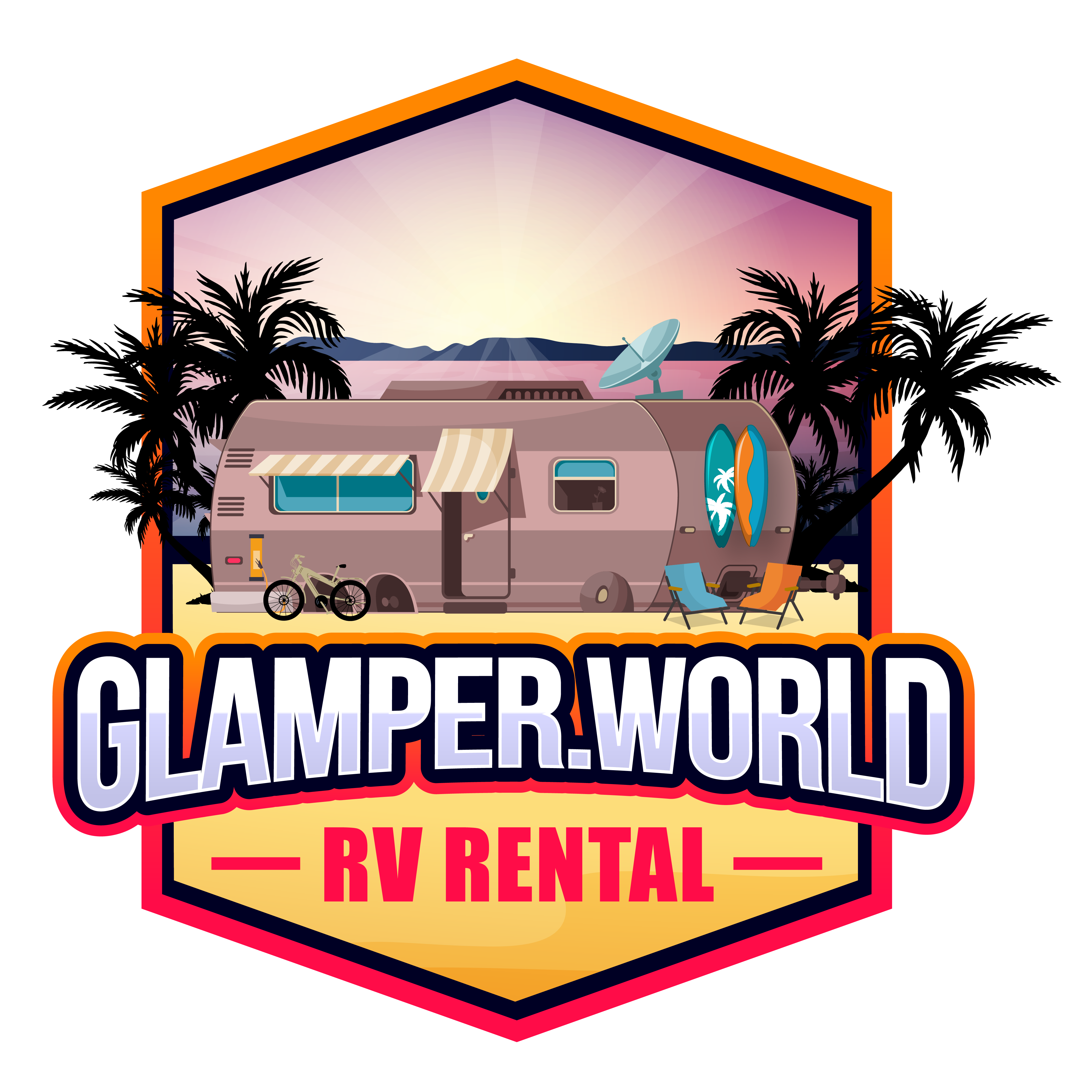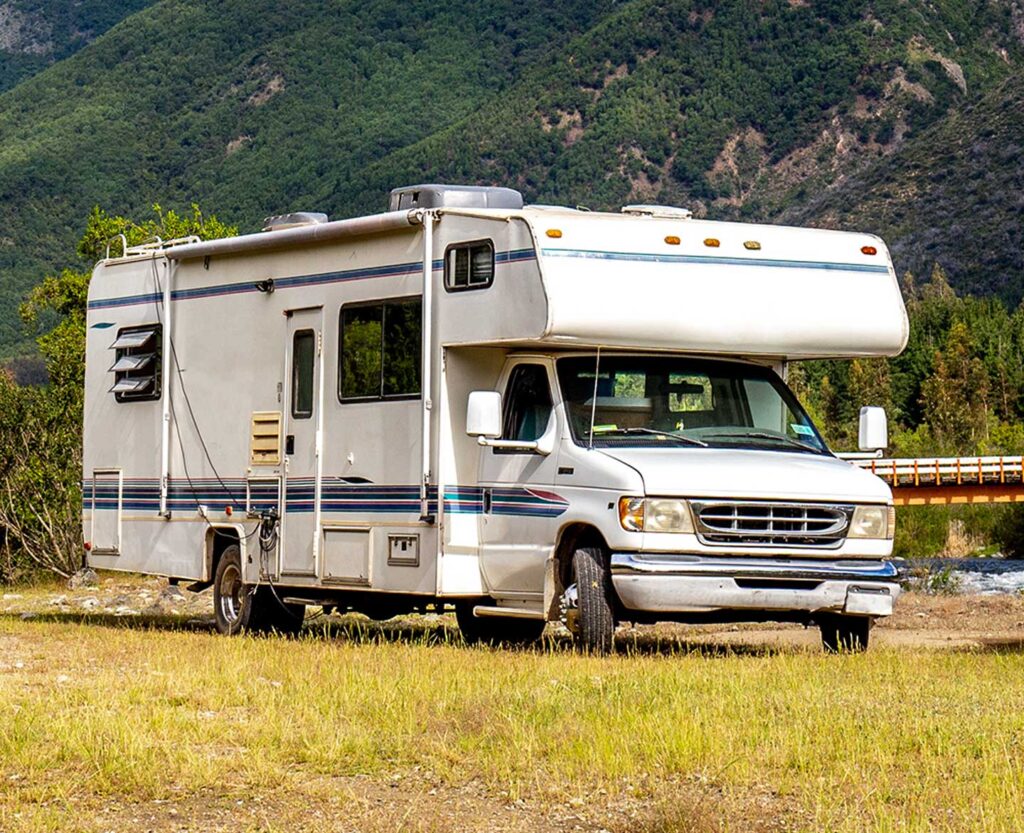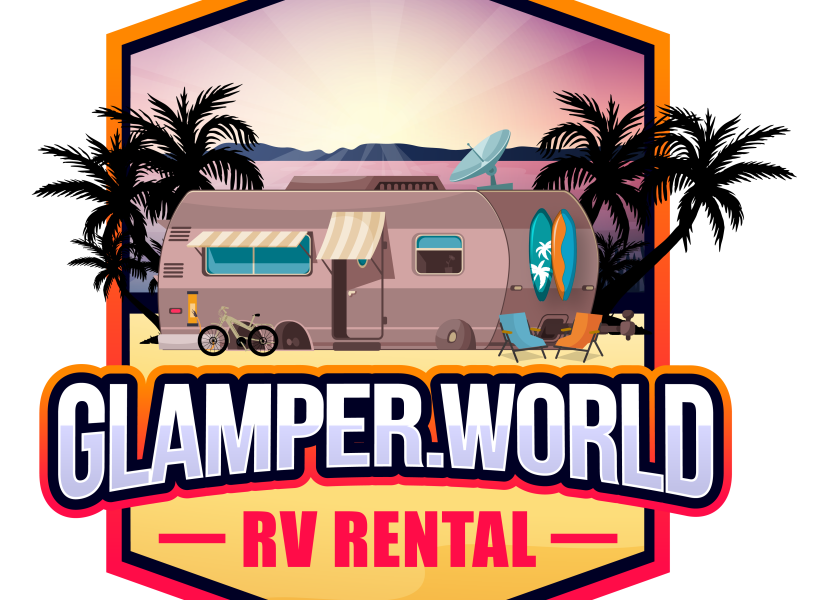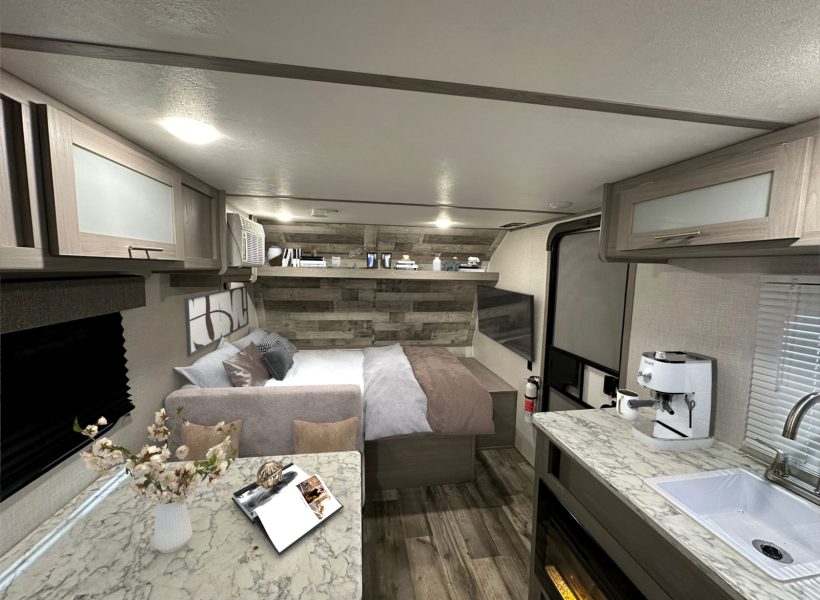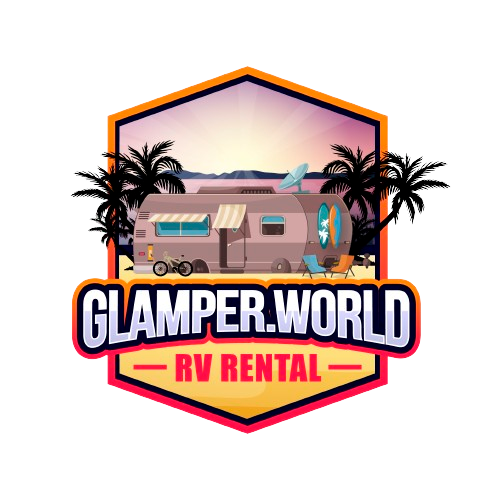Boondocking is camping without hookups to water, electricity, or sewer. You’ll rely entirely on your vehicle’s systems and the resources you bring. It’s an opportunity for free camping in secluded spots like public lands, parking lots, or remote areas. You’ll need to manage your battery, generator, water, and waste tanks carefully.
The benefits are many: it’s cost-effective, peaceful, flexible, and offers a deeper connection to nature. Get ready to use apps, pack essential gear, and practice good resource management. Want to learn how to make the most out of boondocking and find the perfect spots?
Boondocking is Camping on Free Spots or Dispersed Camping
Boondocking or dispersed camping is often called dry camping. Boondocking means camping in your RV without hookups to water, electricity, or sewer. Meaning all you have to do is to rely on your RV’s built-in systems and whatever resources you’ve brought along. This type of camping often takes place on public lands, in parking lots, or remote locations.
You do not have connection to an external power source, so you’ll need to manage your battery and generator usage carefully. Water conservation becomes crucial because you’re limited to the supply in your rvs tanks. Without sewer connections, you’ll also need to monitor your waste tanks closely.
Boondocking is camping in a more self-sufficient and minimalist camping experience, challenging you to be resourceful and prepared. It’s all about enjoying the simplicity and freedom of the great outdoors.
Benefits of Travel Trailer Boondocking
Enjoying the freedom of boondocking allows you to camp in breathtaking, secluded locations without the constraints of traditional campgrounds. You’ll save money by avoiding campground fees, giving you more budget for adventures and activities.
Dispersed camping on public land also means fewer neighbors, offering peace, quiet, and a deeper connection with nature. Without the need for reservations, your travel plans become more flexible, letting you change destinations on a whim.
You’ll develop self-sufficiency skills, learning to manage your resources like water, power, and waste. This off-grid experience reduces your environmental footprint, as you’re not relying on infrastructure-heavy campgrounds.
Plus, boondocking with a travel trailer often leads you to discover hidden gems and unique landscapes you might otherwise miss.
Choosing the Right Location
Finding the perfect boondocking spot requires a bit of research and a sense of adventure. Start by using apps like Campendium or FreeRoam to locate potential sites. Check reviews and photos to ensure the spot meets your needs. Look for areas with level ground, scenic views, and minimal human activity. Public lands managed by the Bureau of Land Management (BLM) or National Forests often provide excellent boondocking opportunities.
Before you head out, verify any regulations or restrictions to avoid fines. Some areas may limit the length of stay or have specific rules about waste disposal. Always consider accessibility; make sure your RV can navigate the terrain safely.
With careful planning, you’ll find a spot that offers both tranquility and beauty.
Essential Gear for Boondocking
Equipping your RV with the right gear can make your boondocking experience more comfortable and enjoyable.
First, invest in a reliable solar power system to keep your batteries charged and devices running. Portable generators are another great option for off-grid power.
A high-quality portable propane stove lets you cook meals easily without relying on electrical appliances. Don’t forget a good set of camp chairs and a sturdy table for outdoor dining and relaxation.
LED lanterns and headlamps provide essential lighting for nighttime activities. A well-stocked first-aid kit is crucial for handling minor injuries.
Lastly, make sure you have a tool kit with basic repair tools to handle any unexpected issues on the road.
Water and Waste Management
Managing water and waste efficiently is key to a successful boondocking adventure. Start by conserving water. Use low-flow faucets and take shorter showers. Bring extra water jugs to extend your stay.
When it comes to waste, always empty your RV’s tanks before heading out. Invest in portable waste tanks for extended trips. Be mindful of where you dispose of greywater and blackwater. Never dump waste in unauthorized areas; it’s illegal and harmful to the environment. Use biodegradable soaps and cleaners to reduce your impact.
Plan your route to include stops at dump stations. Monitor your tank levels regularly to avoid overflows. By managing your resources wisely, you’ll enjoy a smooth and eco-friendly boondocking experience.
Safety Tips for Boondocking
While managing your resources is vital, ensuring your safety during boondocking is equally important. But what to do as a camper? Start by researching your location. Use apps and forums to identify safe spots. Always let someone know your whereabouts and expected return.
Park your RV or motorhome in a spot with a quick exit route. Keep your doors and windows locked, and consider using motion-sensor lights or security cameras. Carry a first aid kit, and familiarize yourself with basic medical procedures. Avoid isolated areas if you’re alone and trust your instincts—if something feels off, move.
Have a reliable communication device, like a charged cell phone or satellite phone. Lastly, maintain situational awareness; stay alert to your surroundings and be prepared for unexpected situations.
Environmental Responsibility
Taking care of the environment is crucial when you’re boondocking to ensure the natural beauty remains for future adventurers. Start by practicing Leave No Trace principles. Always pack out all your trash, and avoid disrupting wildlife. Use biodegradable soap at least 200 feet away from water sources to prevent contamination.
Stick to existing roads and campsites to minimize your impact on the landscape. Be mindful of campfires; use a fire ring if available and make sure the fire is completely out before leaving. Also, conserve water and power to reduce your ecological footprint.
Planning Your Boondocking Trip for the July Club
Having a thoughtful approach to your boondocking trip ensures a memorable and stress-free adventure. Start by researching potential locations and checking local regulations. Some areas might’ve restrictions or require permits.
Always plan your route carefully, considering the terrain and accessibility. Make sure your RV is well-maintained and stocked with essentials like water, food, and extra fuel. It’s also wise to have a backup power source, such as solar panels or a generator.
But, what do you need to do prior to your camping? Don’t forget to download offline maps and emergency contacts. Lastly, pack tools and spare parts for quick repairs. By preparing thoroughly, you’ll be ready to handle any challenges and enjoy the freedom and beauty that boondocking offers.
Frequently Asked Questions
How Can I Find RV Boondocking Spots Using Smartphone Apps?
You can easily find a free camping site using smartphone apps. Download apps like Campendium, iOverlander, or FreeRoam. They provide maps, reviews, and GPS coordinates, making your search for perfect spots quick and convenient.
What Are the Best Online Communities for Boondockers to Join?
You’ll want to join online communities like Boondockers Welcome, Escapees RV Club, and FreeCampsites.net. These platforms offer great resources, tips, and support from fellow boondockers, making your adventures more enjoyable and connected.
Are There Any Specific RVs free camping Etiquette Rules to Follow?
When boondocking, you should follow specific etiquette rules: Leave no trace, respect quiet hours, and avoid overcrowding an area. Always pack out your trash, use biodegradable products, and be considerate of other campers’ privacy and space.
What to do in Winter or Extreme Weather Conditions?
You can boondock in winter or extreme weather conditions, but you’ll need to prepare properly. Insulate your RV, ensure your heating system works, and have enough supplies. Always check weather forecasts and road conditions before heading out.
How Do I Manage Internet Connectivity in a Boondock?
You’ll need a mobile hotspot or a cellular booster to manage internet connectivity. Satellite internet is another option, though it’s pricier. Ensure you have a plan with ample data to stay connected while boondocking.
Consider our RV Rental Service For Your Camping.
Are you thinking about boondocking or free camping? Consider glamper RV rental. Renting rvs eliminates the hassle of packing and hauling bulky camping gear, allowing you to enjoy a stress-free and seamless experience. With our service, you can focus on creating unforgettable memories without worrying about the logistics.
At Glamper World RV Rental, we go above and beyond to ensure your camping adventure is nothing short of extraordinary. Our RV glamper boast top-of-the-line amenities, including custom requests, Starlink internet, smart TVs, Bluetooth speakers, espresso machines, outdoor seating areas, and even two e-bikes for exploring the surrounding terrain.
Conclusion
But what does boondocking mean for RV? Boondocking offers you a unique and rewarding RV experience, letting you connect with nature while enjoying the freedom of off-grid living.
By choosing the right location, bringing essential gear, and managing your resources wisely, you’ll ensure a safe and enjoyable adventure.
Remember to respect the environment and plan thoroughly to make the most of your trip.
Embrace the journey and enjoy the unparalleled sense of freedom that boondocking brings. Happy travels!
